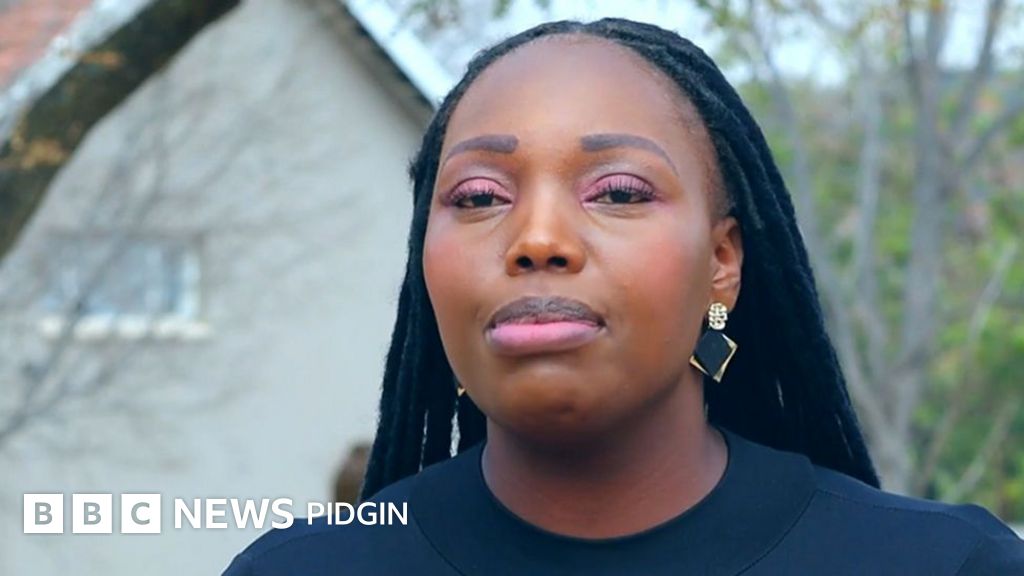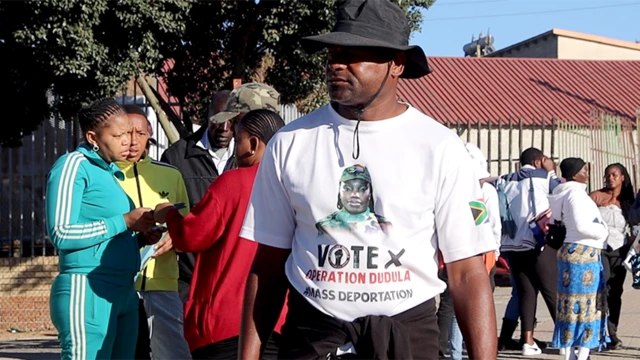 Wetin we call dis foto, Operation Dudula don transform from an anti-migrant pressure group into a political partyArticle InformationAuthor, Mpho LakajeRole, Reporting from Diepsloot
Wetin we call dis foto, Operation Dudula don transform from an anti-migrant pressure group into a political partyArticle InformationAuthor, Mpho LakajeRole, Reporting from Diepsloot
23 minutes wey don pass
One community clinic just north of Johannesburg don become di frontline of one battle for South Africa over weda foreigners fit access public health facilities.
Wetin start as small local action for one area for 2022 don spread, with activists from di openly anti-migrant group, Operation Dudula, wey picket some hospitals and clinics for Gauteng and KwaZulu-Natal provinces. Dem dey check identity cards and stop anyone wey no be South African from entering.
“Dudula” mean to remove sometin by force in di Zulu language.
Despite some arrests, di authorities no dey able to prevent di demonstrations.
Di site of dia latest campaign na for Diepsloot – one poor township of more dan 200,000 pipo near di kontri commercial hub.
On one cool, spring Thursday morning, Sicelokuhle Moyo, wear blue-and-beige skirt, thick windbreaker and black headwrap, as she set out early for di clinic.
Di Zimbabwean, wey don live for South Africa since 2006, dey go dia, as she dey do most times, to collect her medication for one chronic condition.
But dis time, wen she reach di gate, tins dey different.

BBC
I said that I had a passport. They said, they don’t take passports. They want IDs only”
Sicelokuhle Moyo
Two men wey wear white T-shirts with di slogan “Operation Dudula – Mass Deportation” dey stationed for di entrance. Dem demand make evribodi produce dia documents bifor dem go allow dem inside.
“I say I get passport. Dem say dem no dey take passports. Dem want IDs only,” Ms Moyo tok, hiding her frustration behind polite smile.
Despite say dis fit be a potential flashpoint, e get a strange calmness and resignation as pipo know say Operation Dudula activists don dey violent in di past.
Dem pursue anyone wey no fit produce South African ID book.
Slowly as she waka from di entrance, Ms Moyo join group of women by di roadside, wit young children on dia backs, wey dey wait with uncertainty for wetin go hapun next.
Tendai Musvava, one woman in her 40s, face di same fate.
“I bin stand for di queue and den dem say dem [only] need some pipo with IDs. Me, I no get any ID. I get passport, I from Mozambique. So, I no fit get my medication becos I no get ID,” she tok.
Ms Musvava, wey wear bright orange winter jumper and white hat, dey very sad.
“I just feel like say dem dey do wetin dem wan do becos na dia kontri. I no get any say. For now I get to follow wateva dem say. I no get choice.”
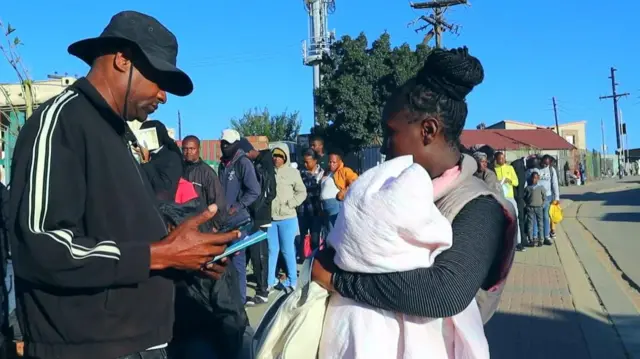
South Africa na home to about 2.4 million migrants, just less dan 4% of di population, according to official figures. Most of dem come from neighbouring kontries such as Lesotho, Zimbabwe and Mozambique, wey get history of providing migrant labour to dia wealthy neighbour.
Xenophobia for long na big issue for South Africa wey don get occasional outbursts of deadly violence, and anti-migrant sentiment don become key political talking-point.
As e start as a campaign, Operation Dudula, wey at times, dey accused of using force to make dia point, now na political party with ambitions to contest next year local govment elections.
Party leader Zandile Dabula insist say wetin her organisation dey do for public clinics for Johannesburg and oda parts of di kontri dey justified.
“We want prioritisation of South Africans. Emergency care – we understand say you must be treated – but if you dey illegal you must be handed over to di law enforcers,” she tell BBC.
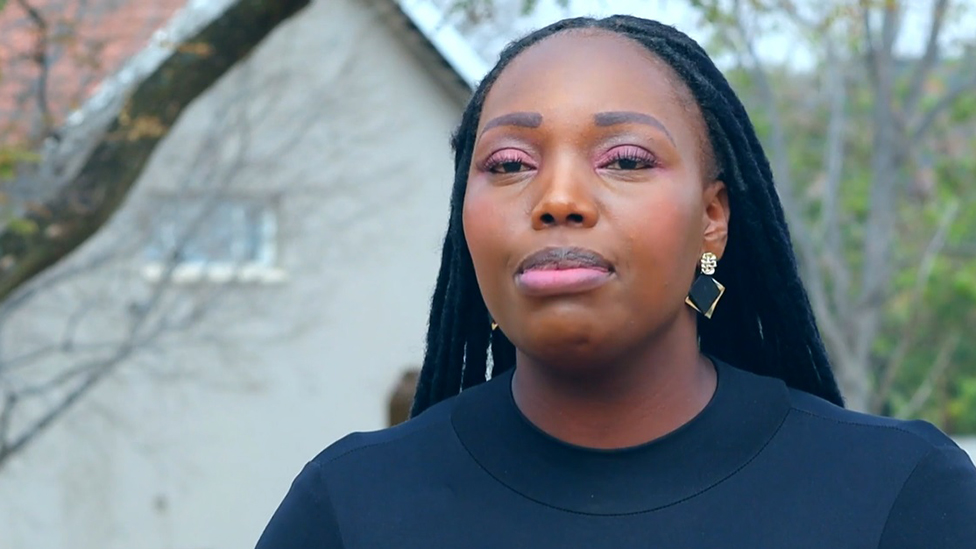
BBC
Health cannot be a freebie for everyone. We cannot cater for the whole globe. We don’t have enough”
Zandile Dabula
Leader, Operation Dudula
Wen dem challenge am with di fact say many migrants dey di country legally, she change to di argument say South Africans need to dey prioritised becos di resources dey small.
“Life come first, we no deny dat one, but e no fit be freebie for everyone. We no fit cater for di whole globe. We no get enof.”
Di constitution guarantee di right to access healthcare for everyone in di kontri, regardless of nationality or immigration status.
But Ms Dabula say di public health system, wey dey cater for almost 85% of di population, dey overburdened.
She say some pipo get to wake up at 04:00 to join long queues for dia local clinic becos dem know say if dem no get dia on time, enof medication no go remain.
South Africa na unequal society, wia much of di kontri wealth dey di hands of a few. Unemployment and poverty levels dey high and migrants, wey often dey live for poor communities, dey collect di blame by some for di problems pipo find demsefs in.
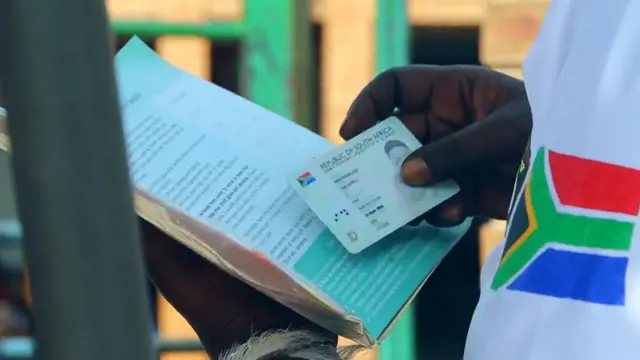
Operation Dudula methods don find sympathetic hearing among some Diepsloot residents.
One of dem, South African Sipho Mohale, describe Operation Dudula campaign as “a positive change”.
“Di previous time wen I come here, di queue bin dey very long. But dis time around, e only take me a couple of minutes to get my stuff and get out,” e tok.
Anoda resident, Jennifer Shingange, also welcome di activists’ presence for Diepsloot.
“As South Africans, we go come clinic, only to find say di medication we need no dey available. But since foreign nationals stop to use di clinic, we don see difference,” she tok.
Ironically, some South Africans no dey spared from di anti-migrant campaign.
Dem too have don turned away from public health facilities becos dem no fit produce ID book – as more dan 10% of South Africans no get proper documents wey prove dia nationality.
But e dey flout di constitution as Operation Dudula actions dey vex activists on di oda side of di argument.
“To get group wey no dey sanctioned by di state to make decisions about who go get in and who go get out dey deeply problematic,” na so Fatima Hassan, human rights lawyer from di organisation Health Justice Initiative tok.
“Unless govment get control on dis situation quite soon, dem go lose di ability to do law and order itself.”
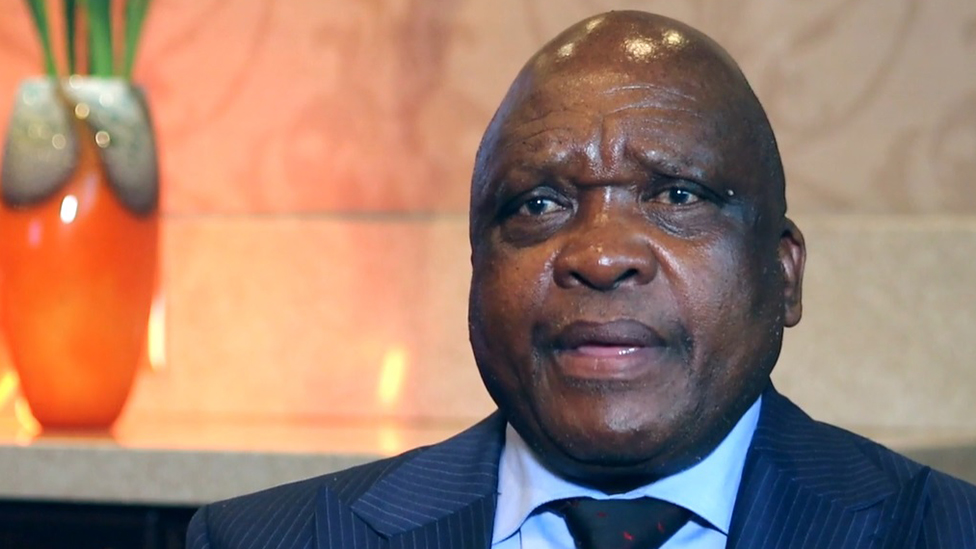
BBC
Health is a human right… you don’t organise it through bullying kind of methods”
Dr Joe Phaahla
Deputy Health Minister
Deputy Health Minister Joe Phaahla tell BBC say im govment dey against targeting foreign nationals or anyone else wey try to use local clinics and hospitals.
“We no agree with dat approach becos health na human right. As much as we understand di fact say di provision of services must dey properly organised, you no go organise am through dis bullying kind of methods,” e tell BBC.
Several major political parties, including di Economic Freedom Fighters and di Democratic Alliance, also don condemn Operation Dudula.
But recent attempt to take am go court by di South African Human Rights Commission fail on a technicality, and dis effectively allow di group to continue dia campaign.
Dem don arrest several Operation Dudula members in recent weeks for blocking di entrances of public health facilities. Dem later release dem with a warning. But di police action, however, no appear to stop di group.
Ms Hassan believe say a stronger action dey required, come say “di police and di military suppose dey dia from day one to prevent [di picketing] becos dat na simply lawlessness”.
Dr Phaahla say dem dey explore dis measure but di police say resources dey “stretched in terms of being able to monitor and intervene on time wen such incidents occur”.
While di state dey hesitate over wetin to do, Operation Dudula appear to dey more emboldened and dem dey turn dia attention to public schools, say dat na part of a campaign to fight illegal immigration.
But for Diepsloot, di group action dey leave pipo without di medical help dem need.
Ms Musvava, wey dem turn away now dey look for alternatives. Despite her lean resources, she dey consider going to di private sector.
“I think I go go to di doctor. I go pay di money. I get to sacrifice to get am,” she tok.
She no get any idea how much e go cost her.
“I no get money, but I get to make a plan.”
